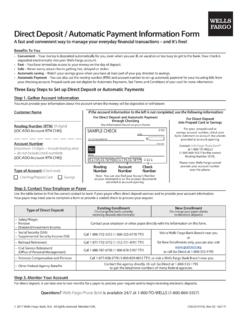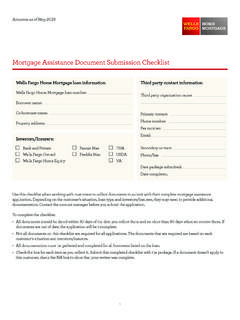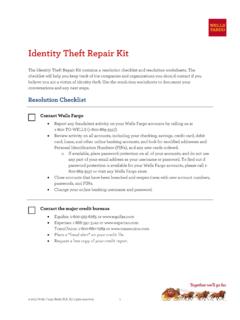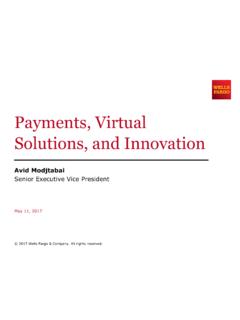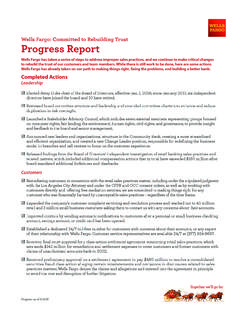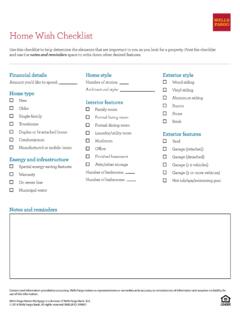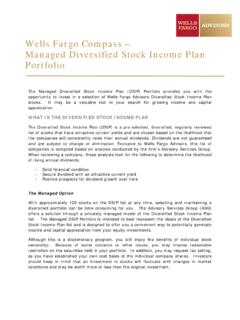Transcription of Estate Care Center Checklist - Wells Fargo
1 What to do when a loved one passes away. Information to help you make financial decisions in a difficult time. Settling accounts can be complicated. We re here to help. Even when it s expected, the death of a loved one is difficult. Dealing with his or her finances can feel overwhelming, especially when the process may take weeks or months to resolve. We re here to make the process of transitioning accounts as simple and straightforward as possible. Every situation is unique. On these next few pages, you ll find some general information that might be helpful.
2 You may also wish to reach out to a lawyer, tax professional, or trusted advisor for assistance. Remember, you don t have to do everything all at once. Prioritizing what you need to do in order of importance can help make the process more manageable. When you re ready, we ll be here to support you. 1 Checklist . This general Checklist can guide you through the practical steps of dealing with your loved one s assets and accounts. We want you to be equipped with the knowledge and resources you ll need to take care of any financial matters that may occur as a result of a death.
3 What to do first Who to call Determine your role. If you ve been named a personal representative or trustee, you have a legal duty to follow the terms of the will or trust agreement. You may want to take the documents you have to a trusted Estate planning attorney for guidance. Even if you do not hold one of these roles, you may want to review these materials to gain an understanding of these parties responsibilities. Order death certificates. You may need multiple certified copies depending on your loved one s Estate (assets, loans, insurance, investments).
4 To get the death certificate, you can visit the Registry of Births, Deaths and Marriages in the applicable city, county, state, parish or territory. Your funeral director may also be able to assist you. Find the will, if any, and check for an established trust. Sometimes these items are located in a safe deposit box or home safe. Review finances ( , incoming bills, check stubs, stocks and bonds, real Estate , bank statements) to learn about assets or payment obligations. Notify insurance companies and submit any claims for possible benefits, including: Life insurance Health insurance Property and casualty insurance (for auto and home owners) Call creditors and check for credit life insurance or accidental death life insurance benefits, including: Credit cards Home or real Estate loans Auto loans Call banks and financial institutions.
5 Once the proper documents are in place, you can review and update accounts, or transfer any assets to the Estate or surviving beneficiaries. Notify employers, current and former, and check for any benefits such as a pension or group insurance. Inform appropriate government agencies to stop any direct deposit benefit payments, where applicable, and check for other benefits for a surviving spouse and any dependent children. Department of Veterans Affairs (1 -800-827-1000 or ) Social Security Administration (1 -800-772-1213 or ) Office of Personnel Management (1 -888-767-6738 or ) Railroad Retirement Board (1-877-772-5772 or ) 2 Checklist , continued.
6 Additional steps you may want to take Helpful items to have on-hand Contact an accountant or tax professional to help you understand any tax implications and file returns, if necessary. Talk to an attorney for additional help and guidance. An attorney can explain the will s meaning, assist with renaming or distributing assets, and help file for probate, if necessary. Probate may not be required if the assets are jointly owned or have designated beneficiaries, if the Estate is small (valued under a certain amount, as defined by applicable state law), or if property is in a trust.
7 It may be helpful to consult an attorney or trusted advisor to discuss options. Sometimes, to take care of transactions, such as retitling accounts, you may need: Social security numbers for surviving beneficiaries Birth certificates for surviving children Marriage certificate Stock certificates Deeds Safe deposit box key Military discharge papers Vehicle titles Insurance policies 3 i To discuss any accounts your loved one owned, we ll need the death certificate and may ask for some documents to identify our customer and the role you will play in handling his or her accounts.
8 Below is a list of documents needed based on account type; however, we may ask for other documents depending on the state in which the accounts were opened or state of residence. We will work with you and help you understand any documents your specific situation requires. Account type What they are Implications Documents* Individual accounts Accounts without a designated beneficiary or surviving co-owner Determining who is responsible for overseeing the distribution of account assets to appropriate beneficiaries may require probate, a court-supervised process.
9 In some states, estates of limited size do not need to go through probate. Court-issued document appointing an executor/ administrator or Small Estate affidavit in accordance with state laws Jointly-held accounts, or accounts with named beneficiaries Joint accounts (checking, savings, credit card or loan, mortgage) Payable-on-death (POD) Transfer-on-death (TOD) Retirement plans Insurance policies Annuities Beneficiary designations determine how the accounts are distributed. Assets held in joint accounts are transferred to the surviving owners.
10 Identification of the joint account holder or beneficiaries Trust accounts Arrangements to hold assets in a trust The trustee is responsible for collecting trust assets and distributing them in accordance with the trust agreement. Certificate of Trust naming a successor trustee *In addition to the death certificate. Note that investment accounts will also need an affidavit of domicile. 4 Documents you may need. Terms & definitions. Affidavit of domicile A document issued by a governing court that verifies where a person resided at the time of death.

